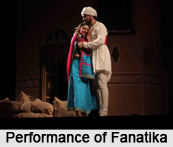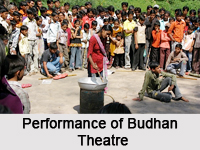 The root of Gujarati theatre is associated with the folk form, Bhavai as in Gujarat, the Bhavai has always been the most important theatrical curio to manifest the unedited realities of life. However the changes from the folk form to the chic form of Gujarati theatre did come gradually.
The root of Gujarati theatre is associated with the folk form, Bhavai as in Gujarat, the Bhavai has always been the most important theatrical curio to manifest the unedited realities of life. However the changes from the folk form to the chic form of Gujarati theatre did come gradually.
History of Theatre Companies in Gujarat
October 29th, back in the year 1853, a play based on the popular and dramatic tale of the Shah Nama was staged at the Grant Road Theatre of Mumbai. That was the beginning of the voyage of the Gujarati theatre. That was indeed the beginning of the concept of theatre companies in Gujarat.
Later, it was the Parsi dramatic companies that laid the foundation of modern Gujarati theatre in the late 1980s. These theatre companies in Gujarat brought western techniques and themes whilst introducing music to renew the whole concept of theatre in Gujarat. The vernacular theatre thus gained a dimension in the hand of these theatre companies in Gujarat. However, it is during the post independence period dramatic activities in Gujarat increased both in terms of quality and quantity. With the coming onto scene of talented playwrights like Dharmaveer Bharati , Mohan Rakesh Surendra Verma , Feroz Khan and others Gujarati theatre gained a whole new facet.
Some of the Theatre Companies in Gujarat are as follows:
Naath Theatre: It elaborated the concept of theatre for the mass whilst entertaining them through the plays of Kamlesh Mota and Babul Bhavsar. It was established in 1992. Naath Theatre`s plays have also been staged in the UAE and East Africa.
Budhan Theatre: Founded by Dr. Ganesh Devy, its mission is to fetch about social change by raising awareness of the historical difficulty of Denotified Tribes, particularly the Chhara community, which has faced physical, social, and psychological fight through its stigmatization as criminal.
Fanatika: Founded by Chintan Pandya on 9th June 2010, Fanatika is the largest youth theatre community in Gujarat. It offers highly professional training on theatre during workshops and residencies. Fanatika organizes Gujarat`s only annual International Theatre Festival since 2012.
Apart from Naath Theatre, another important theatre company in Gujarat is the one, "ideas unlimited". This theatre company has ideally promoted the Gujarati literature and culture to a wider audience.
The journeying of the theatre companies in Gujarat tells the tale of changing traditions in Gujarati natya. Started as just an art form, Gujarati theatre is now one of the medium to manifest the unaltered realisms of society. With immense vivacity, sheer creativity and utter honesty the theatre companies in Gujarat are supporting the Gujarati theatre to stand apart with pride.




















